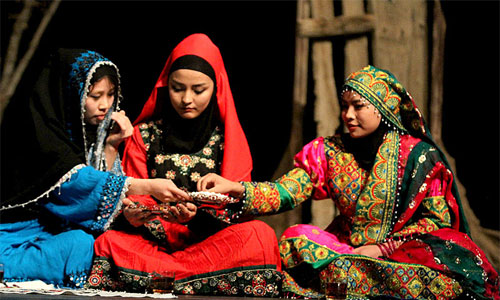In the post-Taliban Afghanistan where women act as ministers, ambassadors, MPs, chairpersons of the Afghan Independent Human Rights Commission, Election Commission and Electoral Complaint Commission, and Permanent Representative to the United Nations, winning the version of Afghan Star does not seem to be as significant as it has been praised by foreign media.
Winning the 14th edition of Afghan Star, a 20-year-old girl Zahra Elham had been branded as a heroine as she bragged that she would fight the Taliban with her music.
Showering Elham with too much praise and congratulatory messages have triggered mixed reactions across the country. A number of young individuals and her voters have expressed their pleasure; whereas other some people, including clerics, believe that it was against their religious beliefs and moral and societal values of Afghanistan. Clerics believe that supporting Afghan Star Program would be a “cultural invasion” supported by western countries. They fear erosion of Afghan social norms and cultural values in the wake of huge import of western culture in Afghanistan.
It is self-explanatory that Afghanistan passed many historical ups and downs with the regime changes, which had direct impacts on women’s status. For example, women had been marginalized from social and political activities during many kingdoms but during Amanullah Khan’s kingdom, the first constitution had been approved banning gender discrimination and liberating women from a marginalized life. Likewise, in the last decade of King Zahir Shah, which is known as the “decade of democracy” or “decade of constitution”, women stepped in social and political life as “gender discrimination” had been banned constitutionally. It was during Zahir’s regime when the voice of woman and then a song sung by a woman first aired through radio in 1950s. Moreover, women became MPs for the first time in fair and free parliamentary elections held during Zahir’s regime.
Similarly, Afghan women had been entitled equally with men during the communist regime and sexual differences could not bar them from participating in social and political activities.
However, they had been discriminated on the grounds of their gender during the Mujahidin’s regime. Worst of all, the Taliban imposed highly strict rule on women and restricted them behind closed doors. Afghan women were barred from social and political activities. Both men and women were punished severely for listening to music.
But in the post-Taliban administration, women have been again entitled equal with men and gender discrimination has no room in Afghan Constitution, which recognizes the Universal Declaration of Human Rights and the United Nations Charter.
Although traditional culture still tends to restrict women’s social and political role, there is no legal barrier before women. The rights and freedoms of women have been advocated widely by women rights’ organizations and NGOs. Millions of dollars have been spent on empowering women. In addition to political figures, Afghanistan generated many female singers.
Since the platform is paved for women to participate freely in social, political, and cultural activities, being a singer or winning a position as an Afghan Star is neither a brave nor an iconoclastic act for Afghan women. Showering a woman with plenty of praise and compliment would be a shocking surprise to Afghan society.
Despite propaganda spread about threat posed to female singers or activists, it is believed that they live a normal life. If they claim that they live a challenging life or face threat, it is simply to gain fame or earn sympathy from outside Afghanistan. But it is undeniable that security issue is widespread in Afghanistan.
Those singers who claim that they would fight against the Taliban through their music and singing, is a matter of doubt since they could not do so during the Taliban’s regime. Now the serious determination of the Taliban and US representatives for talks suggests that the Taliban will reach an agreement and return to Afghanistan. In such a case, they will restrict some activities of men and women and will not provide a platform for singers to continue their tasks. So, how will they fight?
There are secular, religious, and radical individuals in Afghanistan. The activities which create sensitivity or are against cultural values had better not be encouraged. On the other hand, religious individuals had to show tolerance towards their compatriots and stop being too sensitive on such issues.
Home » Opinion » The Public Should Value Cultural Norms
The Public Should Value Cultural Norms
| Hujjatullah Zia

